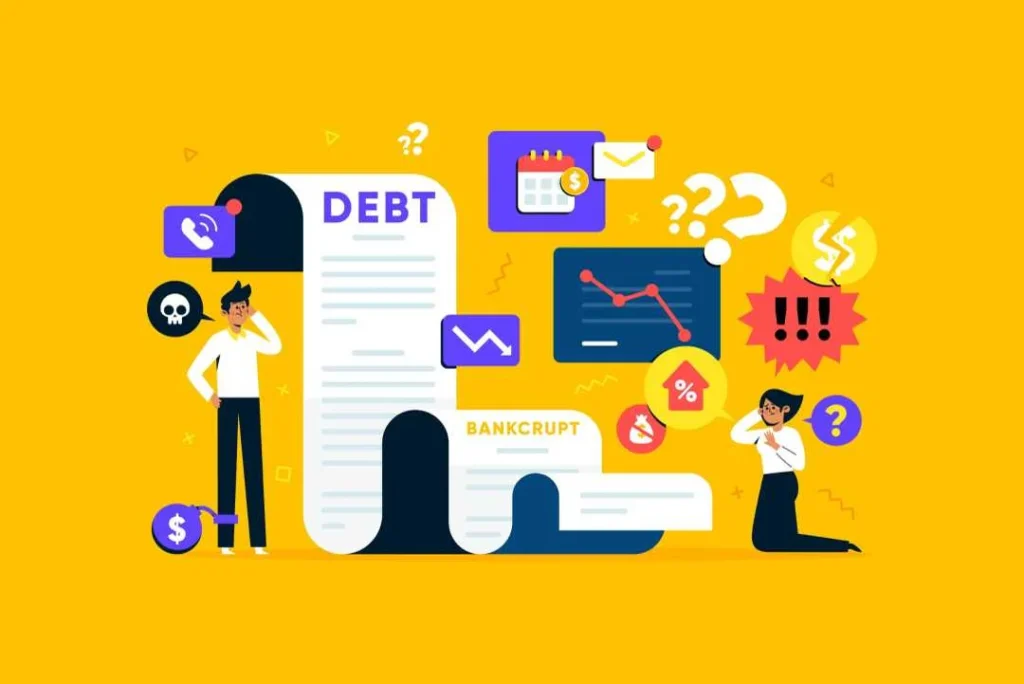
Quick Overviews
A thorough tutorial on writing and mailing a debt validation letter to debt collectors may be found on this page.
Sending a debt validation letter might not be the best course of action in certain situations, such as when you have successfully disputed the debt in the past when you are certain of its legitimacy and are unable to pay it off, when the debt is too small, or when the statute of limitations is about to run out.
If the collector does not respond to your request for information within the allotted time, you have the option to contest the debt after sending a debt validation letter.
Do debt collectors call you nonstop, trying to collect money? Are threatening messages regarding overdue bills filling up your mailbox? But do not worry! This post will explain how to send a debt validation letter, which is an effective instrument that can help you stop those persistent collection attempts and safeguard your rights.
Why Do You Need to Send a Debt Validation Letter?
Although dealing with debt collectors can be intimidating, you can lessen the stress of the process by being aware of your rights. An indispensable instrument in your collection is a letter of debt validation. You can get important information regarding your debt and the debt collector’s methods by submitting this official request. This post will outline the reasons behind sending a debt validation letter, how to do it, and possible results. By the time it’s through, you’ll understand how to take advantage of this instrument and defend yourself against dishonest or deceptive collecting tactics.
Why is a debt validation letter required?
As a safeguard, a debt validation letter guarantees that the debt you are being requested to pay is real and precise. It can be quite daunting to receive a notice of debt collection. Why is a debt validation letter required? The debt collector is required by law to confirm and substantiate the legitimacy of the debt they are attempting to collect. This verifies if the debt is legitimate, has been settled, or if the debt collector has the authority to pursue collection while shielding you from possible fraud.
The Fundamentals of a Letter of Debt Validation
A written request to a debt collector to verify the debt they are pursuing for collection is known as a debt validation letter. Within 30 days of receiving a debt collection notice, you have the right to obtain this validation under the Fair Debt Collection Practices Act (FDCPA). In the letter, specific details regarding the debt should be requested, such as the total amount owing, the identity of the original creditor, and any supporting documentation. This letter transfers the burden of proof to the debt collector, guaranteeing that they furnish you with the required records and evidence of the legality of the debt.
Protections and Rights under the Law
Laws Protecting Consumers
When it comes to interacting with debt collectors, the FDCPA provides consumers with several rights. Debt collectors are subject to strict guidelines governing communication, which include when and how they can get in touch with you. In addition to assisting you in understanding your legal rights, sending a debt validation letter lets the debt collector know that you are aware of them and are ready to enforce them.
The Statute of Limitations
Deciding if the debt is still lawfully collectible is a crucial step in sending a debt validation letter. The statute of limitations on debts varies based on the nature of the obligation and the state in which you live. The debt collector might not be allowed to take legal action to collect the debt if it has passed the statute of limitations. Finding out how old the debt is and if it’s still enforceable can be accomplished by sending a debt validation letter.
The Advantages of Letters of Debt Validation
Defense Against Deception
The defense against possible fraud that a debt validation letter provides is one of its main advantages. Skewed debt collectors could try to collect on debts that you don’t own or that have already been paid off. You can verify the validity of the debt and prevent paying for something you do not owe by asking for validation.
Verifying the Validity of the Debt
To make sure the debt collector has a legitimate claim, you might obtain a debt validation letter. The debt collector must show that they have the legal right to collect the debt, that it is yours, and that the amount owed is accurate. This verification procedure might help you negotiate a reasonable settlement or full payment schedule by pointing out any inconsistencies in the debt collector’s documentation.
How to Send a Letter of Debt Validation
A debt validation letter must have the following crucial components:
- Your details for communication: Add your address and full name.
- Contact details for the debt collector: Provide the name and address of the debt collector.
- Details of the account: Check the amount due and the account number.
- Request for validation: Request verification of the debt from the debt collector, together with the original creditor’s details and supporting evidence.
- Date of correspondence: Indicate the day the letter is being written.
Proof and Documentation
Keep copies of all correspondence you have with the debt collector in addition to your letter. Copies of the debt validation letter, the mailing proof, and any answers you get are all included in this. These records may be necessary in the event of disagreements or court cases.
Important Information Absent
Don’t make the usual mistake of leaving out important details like your account number or contact information when sending a debt validation letter. If your letter isn’t full, the debt collector may disregard your request or take longer to validate it.
Not Sending the Letter on Time
After getting the debt collection notice, you have 30 days to submit your debt validation letter. If you miss this date, the debt collector may be able to move forward with collection activities, and you may lose your ability to request validation.
What Comes Next After a Debt Validation Letter Is Sent?
Awaiting a Reaction
The debt collector has a reasonable amount of time to respond after receiving the debt validation letter. This usually implies that they have to stop collecting until they give you the validation that you have sought. While you wait, remember to stay on top of any pending emails and deadlines.
Continuation
Think about sending the debt collector another letter if you don’t hear back from them. You might be able to contest the debt with credit reporting companies or get legal advice if it is still unvalidated.
When to Get Legal Help
Complex Debt Circumstances
Seeking legal counsel may be prudent if you find yourself dealing with exceptionally complex debt problems, such as several debts from various collectors or legal challenges over debts. You can protect your rights and receive competent legal guidance throughout the process.
Expert Counsel
Legal experts can offer personalized guidance based on your unique circumstances, guiding you through the challenges of debt verification and retrieval. They can also act as your legal representative, defending your rights.
When You Shouldn’t Send a Letter
Although a debt validation letter can be an effective instrument for defending your rights and safeguarding yourself against possible fraud, there are several circumstances in which it might not be the best idea to write the letter. When should you think twice before sending a debt validation letter?
- Debt already acknowledged: Sending a debt validation letter might not be useful if you have already acknowledged the debt, for example, by consenting to a settlement or payment plan. It might not be necessary for the debt collector to offer more proof.
- Near or past the statute of limits: Sending a debt validation letter could unintentionally restart the statute of limitations, giving the debt collector additional grounds to pursue the debt if it is close to or has already passed.
The debt collector is trustworthy and helpful. It might not be necessary to write a debt validation letter if the debt collector is well-known to be trustworthy and has spoken openly and sincerely. It might be more effective to deal with the debt collector directly.
Possible legal consequences: Sending a debt validation letter might not be the best course of action if the debt collector has already filed a lawsuit. In some situations, seeking legal advice could be a wiser course of action. - Effect on credit report: Sending a debt validation letter can not have an impact if the debt is valid and you haven’t previously contested it. Instead, to lessen the effect on your credit, think about negotiating a settlement or a payment schedule.
It’s crucial to thoroughly consider the benefits and drawbacks of submitting a debt validation letter in each of these situations. When in doubt, seeking legal advice from an expert can help you decide what is best for your particular circumstances.
Debt Validation Letter Sample
You can use this sample debt validation letter as a model to ask a debt collector for validation. Add your information and particulars regarding the debt in question to make the letter uniquely yours.
[Your Name]
[Your Address]
[City, State, Zip Code]
[Your Phone Number]
[Your Email Address]
[Date]
[Debt Collector’s Name]
[Debt Collector’s Address]
[City, State, Zip Code]
Dear [Debt Collector’s Name],
Re: Account No. [Your Account Number]
Regarding the aforementioned account, I am writing in response to your email dated [Date of Collection Notice]. In compliance with the Fair Debt Collection Practices Act, I am requesting validation of the debt (FDCPA).
To verify the debt, kindly send me the following details and supporting documentation:
the initial creditor’s name and address.
The total amount owed, including interest and other costs.
a copy of any contract or written agreement stating my responsibility for the debt.
Evidence proving your legal right to pursue collection of this debt.
a thorough breakdown of the debt, including any new charges and transactions.
Please be advised that I will contest the debt until you supply this information. Furthermore, I ask that you stop all efforts at collection and don’t report this debt to any credit reporting companies.
Within 30 days, I anticipate a fast response to this request from you. I will consider this debt invalid if you do not provide the needed validation. I may then take additional action, such as disputing the debt with credit reporting agencies or getting legal counsel.
Kindly reply to the above-mentioned address. I appreciate you taking the time to consider this.
Regards,
[Name]
When to Challenge a Loan
You might hear back from the debt collector after receiving your letter of debt validation. Things can get intriguing at this point. You have every right to contest the debt if the collector does not provide the desired information within the allotted period.
Make sure you acquire any supporting documentation when disputing a debt. Payment receipts, bank statements, and any other pertinent paperwork may be examples of this. Give the collector this proof and state your case for why you think the debt is false or erroneous.
Recognize your rights. To learn what debt collectors can and cannot do, familiarize yourself with the Fair Debt Collection Practices Act (FDCPA).
The Best Ways to Handle Debt Collectors
Although dealing with debt collectors can be intimidating, try not to let them scare you! The following are recommended practices to bear in mind:
Maintain documentation: Ensure that you maintain a log of every conversation you have with debt collectors, including the times, dates, and identities of the people you speak with.
Remain composed and confident. Even though it’s normal to feel frustrated, it’s crucial to deal with debt collectors coolly and assertively. Recall that you are entitled to certain things!
Consult a professional: If you’re feeling overwhelmed or uncertain about how to handle a situation involving debt collection, think about consulting with a respectable credit counseling organization or a consumer protection lawyer.
You may confidently negotiate the intricate world of debt collection and assert your rights by adhering to these best practices and arming yourself with knowledge.
Last Words
Don’t freak out the next time debt collectors knock on your door. Obtain a debt validation letter to empower yourself and take charge of the circumstance. Just keep in mind the appropriate ways to write and deliver a letter of debt validation. You can succeed at this!
Answers to related questions (FAQs)
A Debt Validation Letter: What Is It?
A formal request for documentation proving the validity of a debt and the debt collector’s right to collect it is known as a Debt Validation Letter.
Should I send a letter of debt validation?
If you are unsure whether the debt is legitimate or believe the debt collector does not have the authority to collect the bill, you could send a debt validation letter.
What Information Needs to Be in a Debt Validation Letter?
Your name, address, the date, the name and address of the debt collector, and a request for further information regarding the debt, including the original creditor, account number, amount claimed, and any supporting documentation, should all be included in a debt validation letter.
Does the sending of a debt validation letter put an end to debt collection?
Yes, after receiving your validation request, a debt collector is required by the Fair Debt Collection Practices Act (FDCPA) to stop collecting until the desired information has been given to them.
What Happens If a Debt Collector Is Unable to Prove My Debt?
You have every right to contest the debt if a debt collector does not offer the required certification within the allotted period.
How Can I Challenge a Debt?
Obtain any supporting documentation, such as bank statements, payment receipts, or other pertinent records, before disputing a debt. Give the collector this proof and state your case for why you think the debt is false or erroneous.
What Rights Do I Have Against Debt Collectors?
The Fair Debt Collection Practices Act outlines your rights when interacting with debt collectors (FDCPA). A few rights are the ability to sue a collector who infringes on your rights, the right to privacy, and the right to have your debt validated.
What Happens If I Can’t Pay Off My Debt?
It could be more advantageous to speak with your creditor personally and explain your circumstances if you are unable to pay off your debt. Numerous creditors provide hardship programs that might assist you in settling on a more affordable payment schedule or even in lowering the total amount of debt.
And in case the debt is too little,?
It could be more practical to just settle the debt with the creditor if it is reasonably small and you have the resources to pay it off without experiencing severe financial hardship.


